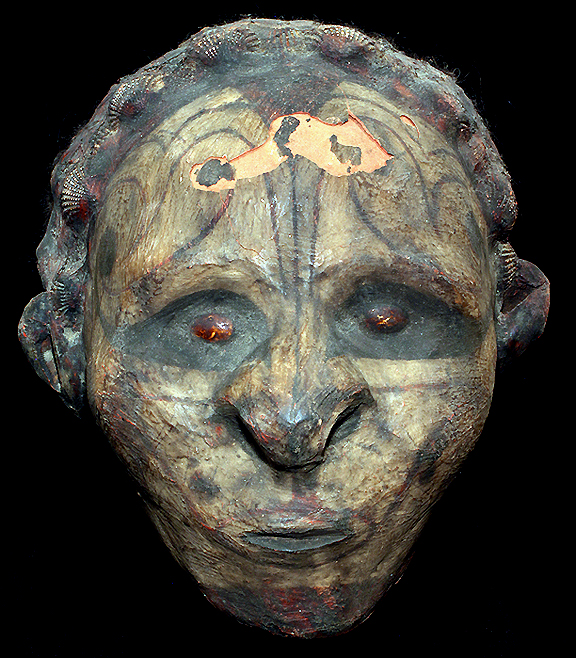
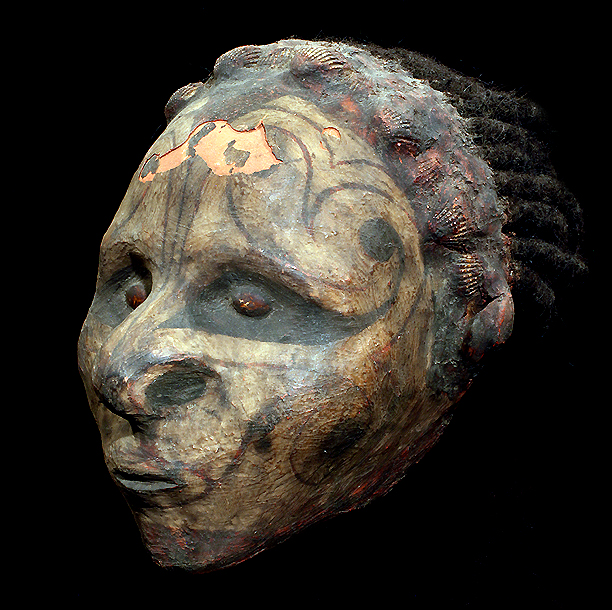

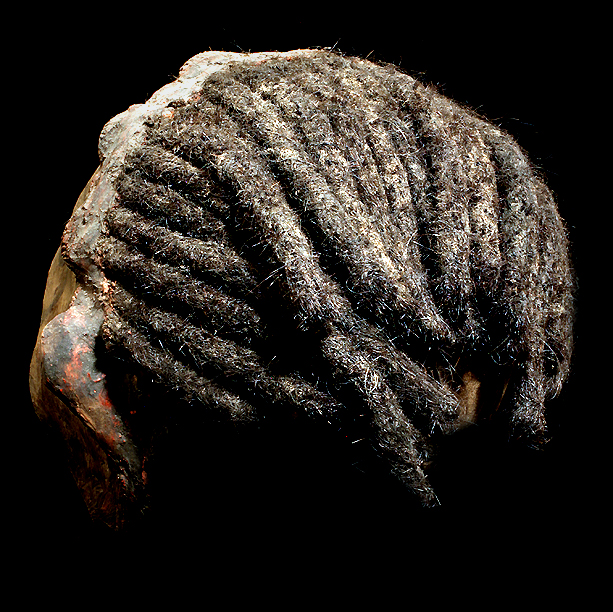
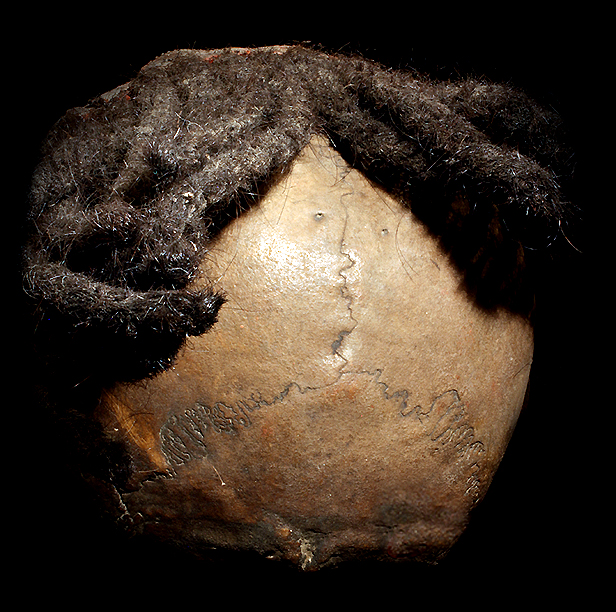

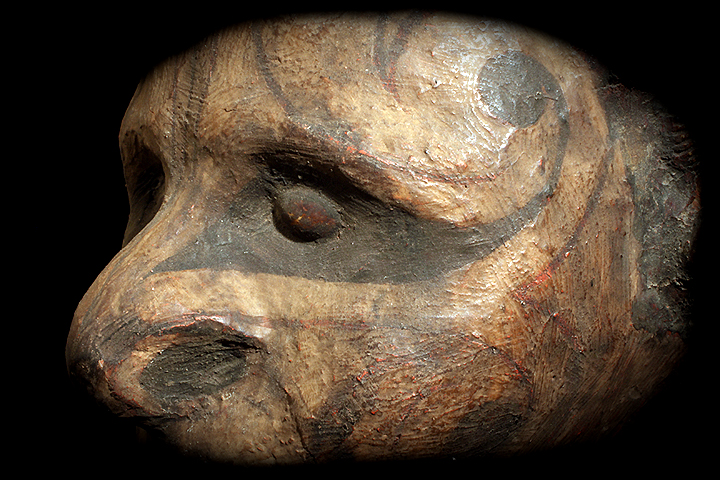

|
OVER MODELED HUMAN SKULL #9 |
        |
|
HUMAN TROPHY SKULLS OUTSIDE OF THEIR HUTS, AS WELL AS, MOUNT THEM OVER THEIR HEARTHS INSIDE OF THEIR HOMES. THE DAYAK, IFUGAO, AND NAGA HUMAN SKULLS ARE HEAD HUNTING TROPHIES. THE ASMAT "ANCESTOR" SKULLS. THE DIFFERENCE IS; HEAD HUNTED SKULLS ARE ACQUIRED FROM ENEMY ANCESTOR SKULLS ARE COLLECTED AND VENERATED TO REMEMBER DECEASED FAMILY MEMBERS. THE IFUGAO COLLECT BONES OF DEAD RELATIVES; WRAP THEM IN TRIBAL TEXTILES, AND STORE THEM IN THE RAFTERS UNDER THEIR HUTS. HUMAN SKULLS AND SKULL CAPS FROM NEPAL ARE RITUAL OFFERTORY VESSELS THAT ARE USED AS DRINKING CUPS IN TIBETAN BUDDHIST CEREMONIES. head after killing the person. Headhunting was practiced in historic times in parts of Oceania, South and Southeast Asia, West and Central Africa, and Mesoamerica, as well as among certain tribes of the Celts, the West Germanic tribes, and Scythians of ancient Europe. It occurred in Europe to the end of the Middle Ages in Ireland and the Anglo-Scottish border regions, and until the 19th century in Montenegro, Croatia, Albania and western parts of Herzegovina. The headhunting practice has been the subject of intense study within the anthropological community, where scholars try to assess and interpret its social roles, functions, and motivations. Anthropological writings explore themes in headhunting that include mortification of the rival, ritual violence, cosmological balance, the display of manhood, cannibalism, prestige by taking on a rival's spirit and power, and as a means of securing the services of the victim as a slave in the afterlife. Today's scholars generally agree that headhunting's primary function was ritual and ceremonial. It was part of the process of structuring, reinforcing, and defending hierarchical relationships between communities and individuals. Some experts theorize that the practice stemmed from the belief that the head contained "soul matter" or life force, which could be harnessed through its capture. In Southeast Asia, anthropological writings exist on the Murut, Ilongot, Igorot, Iban, Dayak, Berawan, Wana, and Mappurondo tribes. Among these groups, headhunting was usually a ritual activity rather than an act of war or feuding and involved the taking of a single head. Headhunting acted as a catalyst for the cessation of personal and collective mourning for the community's dead. Ideas of manhood and marriage were encompassed in the practice, and the taken heads were highly prized. Other reasons for headhunting included capture of enemies as slaves, looting of valuable properties, intra and inter-ethnic conflicts and territorial expansion. Italian anthropologist and explorer Elio Modigliani visited the headhunting communities in South Nias (an island west of Sumatra) in 1886, and produced an in depth study of their society and beliefs. He found that the main purpose of headhunting was the belief that by owning another person's skull, the victim would serve as a slave of the owner for eternity in the afterlife, and thus human skulls were a valuable commodity. Sporadic headhunting continued in Nias island until very recent times, the last reported incident dating from 1998. Headhunting was practised among Sumba people until the early 20th century. It is done only in a large war parties, not in silence and secrecy like in hunting wild animals. The skulls collected were hung on the skull tree erected in the center of village. As recently as 1998, in Waikabubak, a major clash of clans resulted some people decapitated, reminiscent of the old headhunting tradition. Kenneth George wrote about annual headhunting rituals that he observed among the Mappurondo religious minority, an upland tribe in the southwest part of the Indonesian island of Sulawesi. Actual heads are not taken; instead, surrogate heads are used, in the form of coconuts. The ritual, called pangngae, takes place at the conclusion of the rice-harvesting season. It functions to bring an end to communal mourning for the deceased of the past year; express intercultural tensions and polemics; allow for a display of manhood; distribute communal resources; and resist outside pressures to abandon Mappurondo ways of life. Around the 1930s, headhunting was suppressed among the Ilongot in the Philippines by the US authorities. The Igorot in the Philippines also practiced headhunting. The Rice Terraces of the Philippine Cordilleras and Banaue Rice Terraces are the main tourist attractions in the province. These terraces are believed to have been hand-carved into the mountains 2,000 years ago to plant rice. However, recent research by carbon dating suggests that they were built much later. In 1995, the Rice Terraces of the Philippine Cordilleras were declared as a UNESCO World Heritage Site. In 2008 and 2015, the Hudhud chants of the Ifugao and the Punnuk (Tugging rituals and games) were inscribed in the UNESCO Intangible Cultural Heritage Lists. Prior to colonization, Ifugao was a massive highland plutocracy, among the most sophisticated and prosperous of its kind in the whole archipelago and one of the two grandest highland plutocracies in Luzon, the other being the Plutocracy of Kalinga. The state existed for over 2,000 years and have built massive rice terraces that would be a symbol of the province in later time. There were no monarchs in the state. The state was ruled by its council of elders which led the state into a peaceful and prosperous plutocracy which developed one of the best agricultural technologies in Asia at its time. The state consisted of various subgroups which had similar yet somewhat distinct culture and traditions. Conflicts among the Ifugao people were resolved in the most peaceful way possible. Unlike most of the highland plutocracies in the Cordilleras at the time, the Plutocracy of Ifugao had the least conflict with lowland settlers. Kiangan was known as the birthplace of the Ifugao people and Hungduan as the epicenter of its culture. Ifugao culture revolves around rice, which is considered a prestige crop. There is an elaborate and complex array of rice culture feasts inextricably linked with taboos and intricate agricultural rites, from rice cultivation to rice consumption. Harvest season calls for grandiose thanksgiving feasts, while the concluding harvest rites tungo or tungul (the day of rest) entail a strict taboo of any agricultural work. Partaking of the rice wine (bayah), rice cakes, and moma (mixture of several herbs, powdered snail shell and betel nut/arecoline which is used as a chewing gum to the Ifugaos) is an indelible practice during the festivities and ritual activities. Agricultural terracing and farming are the principal means of livelihood. Their social status is measured by the number of rice field granaries, family heirlooms, gold earrings, and carabaos (water buffaloes). Prestige is also conferred through time and tradition. The more affluent, known as kadangyan, were usually generous by nature, giving rice to poor neighbors in time of food shortage(s) and/or hardship(s). Furthermore, their culture was known for their legal system, using one of the world's most extensive oral legal traditions specifying the offense depending on the use of custom law; trial by elders (influenced in part by public opinion); or trial by ordeal. The wealthy were subjected to greater fines than the poor. A village in the Batad rice terraces Untouched by the influences of Spanish colonialism, Ifugao culture values kinship, family ties, religious and cultural beliefs. Ifugao are unique among all ethnic groups in the mountain province for their narrative literature such as the hudhud, an epic dealing with hero ancestors sung in a poetic manner. Also unique to the Ifugao is their woodcarving art, most notably the carved granary guardians bului and the prestige bench of the upper class, the hagabi. Their textiles are renowned for their sheer beauty, colorful blankets and clothing woven on looms. Houses were well-built, characterized as square with wooden floors, windowless walls, and pyramidal thatch roofs. Elevated from the ground by four sturdy tree trunks, they feature removable staircases that were hoisted up at night to prevent entry by enemies or wild animals. Lastly, their attire remain traditional for male Ifugaos, donning the wanno or g-string; there are six types of wanno which are used depending on the occasion or the man's social status. Ifugao is named after the term i-pugo ("i" [from/people] and pugo [hill]), which translates to people of the hill. Alternatively, the province's name may have come from the word pugaw, which means "the cosmic earth", ipugaw then referring to "mortals". Finally, the name may have been derived from ipugo, a type of grain in local mythology given to the people by Matungulan, the god of grains. |
| |
Asian tribal art, artifacts, ifugao, kalinga, bontoc,
asmat, dayak, philippines, asia, head hunters, human trophy skull,
skulls, african, antiques, naga, necklace, headdress, head hunting
trophy skull, Indonesia, Indonesian, SOUTHEAST ASIA, Borneo, Sarawak,
ANTIQUES, Kalimantan, Sulawesi, ART, Sumatra, Timor, ARTIFACTS, Bali,
Java, INDIA, Flores, Sumba, NEPAL, Savu, Roti, BABAS, Lombok, Malaysia.
HOLY MEN, Nusa Tengara, New Guinea, SHAMAN, Irian Jaya, Moluccas,
CONTEMPORARY ART, Tanimbar, Leti, OLD, Lembata, Alor, MINILA,
Philippines, Luzon, PALAWAN, Mindanao, Sulu, BLOW GUN, Southeast Asia,
Asia, NOSE RING, Asian, Burma, HAT, Myanmar, India, SWORD, Nagaland,
Nepal, KNIFE, Tibet, Himalaya, MOUNTAIN, Himalayan, Assam, TRIBES,
Thailand, Vietnam, YAO, Yunnan, Hainan,
HMONG, China, Central Asia, ZAO, Dayak, Batak, BAG, Toraja, Naga,
POLE, Chin, Li, QUIVER, Miao, Bahau, MASK, Punan, Penan, MODELED SKULL,
Modang,
Kayan, BRASS COIL, Kenyah, Ngaju, COILS, Kontu, Kantu, TEXTILE, Iban,
Maloh, PRIEST, Tunjung, Busang, RITUAL, Aoheng, Dong Son, MYSTICAL
Konyak, Tangkhul, MYSTIC, Ao, Angami, PRIMITIVE, Sema, Wancho, HAND
MADE,
Bontoc, B'laan, ARTIST, Bagabo, Gaddang, BULUL, Ifugao. Sculpture,
BULULS, statue, mask, BOX, beadwork, bead, AUTHENTIC, textile, weaving,
TRIBAL,
costume, hat, WOODEN, shield, spear, WOOD, helmet, sword, BOAR, charm,
fetish, FEATHERS, drum, basket, FEATHER, basketry, jewelry, SILVER,
ornament, weapon, ASMAT Canoe, amulet, decoration, SCULPTURAL,
architecture, architectural, SCULPTURE, longhouse, headhunter, SKULL,
headhunting,
shaman, TRIBAL, festival, ceremony, ceremonial, SHAMAN ritual, tattoo,
HEAD HUNTER Skull, dragon, hornbill, HEADDRES, art, tribal, VIETNAM,
tribe,
culture, TRIBES, cultural, myth, TRIBAL, artifact, artefact, REAL,
wood, stone, HAND WOVEN, cotton, metal, CAST bronze, brass, cloth,
ISLAND, tropics, tropical, EQUATOR, ethnographic, EQUATORIAL, Tribal
Art,
Primitive Art, Ethnographic Art, Oceanic Art, Folk Art, Ethnic
Cultures,
AUTHENTIC Artifacts, Textiles, ANCIENT, Costumes, Sculpture,
SCULPTURES,
Masks, Beadwork, BEADS, Fetishes, Charms, GOLD Jewelry, Baskets,
BAMBOO,
Weapons, Shields, ORNATE, Indonesia, Borneo, PUPPETS, Sumatra,
Sulawese,
SHADOW PUPPET, Java, Bali, CAVE, Timor, Flores, ISLAND, Sumba. Lombok,
VILLAGE, Molucca, Philippines, RICE TERRACE, Luzon, Mindanao, DAVID
HOWARD
PHOTOGRAPHY, Nepal, Burma, SACRED JOURNEY: THE GANGES TO THE HIMALAYAS,
Thailand, THE LAST FILIPINO HEAD HUNTERS, Laos, Vietnam, TEN SOUTHEAST
ASIAN
TRIBES FROM FIVE COUNTRIES, India, Central Asia, NECKLACES, Southeast
Asia,
Dayak, STATUE, lban, Kayan, INK STAMP, Kenyah, Modang, FEATHERED,
Bahau, Ngaju, HORSE, Batak, Toraja, NAGALAND, Naga, Dong Song. TRIBAL
ART, AUTHENTIC PRIMITIVE ART, OLD ETHNOGRAPHIC ART, RARE OCEANIC ART,
BEAUTIFUL FOLK ART, ETHNIC CULTURES, TRIBAL ARTIFACTS, TEXTILES,
ASIAN,
COSTUMES, SCULPTURE, WOOD MASKS, BEADWORK, CHARMS, FETISHES, SIVER
JEWELRY BOXES, BASKETS, WEAPONS, FILIPINO SHIELDS, INDONESIA, BORNEO,
ETHNOGRAPHIC, SUMATRA, SULAWESE, TRIBAL, JAVA, BALI, TRIBES, TIMOR,
FLORES, ASIAN,
SUMBA. LOMBOK, TRIBES, MOLUCCA, PHILIPPINES, TRIBAL, LUZON, ASIAN,
MINDANAO, NEPAL, ASIA, BURMA, THAILAND, TRIBAL, LAOS, VIETNAM, TRIBES,
INDIA,
CENTRAL TRIBAL ASIA, ARTIFACTS, SOUTHEAST ASIA, HEAD HUNTER, DAYAK,
ASIAN, IBAN, KAYAN, TRIBE, KENYAH, MODANG, TRIBAL, BAHAU, NGAJU, ASIAN,
BATAK, TORAJA, TRIBE, NAGA, tribal art, ASIAN, primitive art, ASIA,
ethnographic
art, TRIBAL, oceanic art, ASIAN folk art, SOUTHEAST ASIA ethnic
cultures,
artifacts, ASIAN, textiles, costumes, VILLAGE sculpture, masks, TRIBAL
beadwork, fetishes, TRIBES charms. jewelry, TRIBE, baskets, weapons,
TRIBAL,
shields, indonesia, ASIAN, borneo. sumatra, TRIBAL ART sulawese, java,
HILL TRIBE, bali, timor, ASIAN, flores, sumba, TRIBES, lombok, molucca,
BULUL STATUES philippines, luzon, ISLAND ART, mindanao, nepal, ASIA,
burma, thailand, JOURNEY laos, vietnam, TRIBAL, india, central asia,
TRIBE, southeast asia, OLD ART, dayak. lban, TRIBES, kayan, kenyah,
ASIAN, modang, bahau, AUTHENTIC TRIBAL ART, ngaju, batak, HEADDRESS,
toraja, naga, MOUNTAIN PROVINCE, dong song, KALINGA, Indonesia,
Indonesian, IFUGAO, Borneo, Sarawak, BONTOC, Kalimantan, Sulawesi,
TRIBAL, Sumatra,
Timor, ASIAN, Bali, Java, OLD TRIBAL ART
Flores, Sumba, Savu, Roti, Lombok, Malaysia. Nusa Tengara, New Guinea,
Irian Jaya, Moluccas, Tanimbar, Leti, Lembata, Alor, Philippines,
Luzon, Mindanao, Sulu, Southeast Asia, Asia, Asian, Burma. Myanmar,
India, Nagaland, Nepal, Tibet, Himalaya, Himalayan, Assam, Thailand,
Vietnam, Yunnan, Hainan, China, Central Asia, Dayak, Batak, Toraja,
Naga, Chin, Li, Miao, Bahau, Punan, Penan, Modang, Kayan. Kenyah,
Ngaju, Kontu, Kantu, Iban, Maloh, Tunjung, Busang, Aoheng, Dong Son,
Konyak, Tangkhul, Ao, Angami, Sema, Wancho, Bontoc, B'laan, Bagabo,
Gaddang, Ifugao. Sculpture, statue, mask, beadwork, bead, textile,
weaving, costume, hat, shield, spear, helmet, sword, charm, fetish,
drum, basket, basketry, jewelry, ornament, weapon. Canoe, amulet,
decoration, architecture, architectural, longhouse, headhunter,
headhunting,
shaman, festival, ceremony, ceremonial, ritual, tattoo. Skull, dragon,
hornbill, art, tribal, tribe, culture, cultural, myth, artifact,
artefact, wood, stone, cotton, metal, bronze, brass, cloth, tropics,
tropical, ethnographic,
primitive, art, masks, asian, ethnographic, oceanic, folk, ethnic
cultures,
artifacts, Bahau, Kalimantan, indonesia, borneo, sumatra. sulawese,
java, bali, timor. flores, sumba, lombok, molucca, philippines, luzon,
mindanao, nepal, burma, thailand, laos, vietnam, india, central asia,
southeast. dayak, lban, kayan, kenyah, modang, bahau, ngaju, batak.
toraja, naga, dong song. Myanmar, Burma, Kachin, Naga, Konyak, Chin,
Ao, Wancho, Thangkul, Dao, Helmet, Hat, Hornbill, Mizo, Sema, Assam,
India, Mithan, Maram, Morung, Myth, Dream, Post, Pillar, Panel,
Architecture,
Architectural, Tusk, Hill Tribe, Sacrifice, Skull, War Path, Ritual.
Spirit, Figure, Motif, Design, Ceremony, Ceremonial, Raid, Fur, Claws,
Teeth, Fangs, Carving, Statue, Sculpture, Kalinga, Ifugao, Luzon,
Mindanao, T'boli, Bagabo, B'laan, Sulu, Philippines, Weaving, Blouse,
Skirt, Sarong, Shawl, Necklace, Bracelet, Conch Shell, Shell, Brass,
Spear.
Feather, House, Tradition, Traditional, Ancestor, Cloth, Ikat, Chapan,
Uzbek, Asia, Turkoman, Turkamen, Dragon, Snake, Bird, Gong, Island,
Indonesia, Indonesian, Borneo, Sarawak, Kalimantan, Sulawesi, Sumatra,
Timor, Bali, Java, Flores, Sumba, Savu, Roti, Lombok, Malaysia. Nusa
Tengara, New Guinea, Irian Jaya, Moluccas, Tanimbar, Leti, Lembata,
Alor, Philippines, Luzon, Mindanao, Sulu, Southeast Asia, Asia, Asian,
Burma. Myanmar, India, Nagaland, Nepal, Tibet, Himalaya, Himalayan,
Assam, Thailand, Vietnam, Yunnan, Hainan, China, Central Asia, Dayak,
Batak, Toraja, Naga, Chin, Li, Miao, Bahau, Punan, Penan, Modang,
Kayan.
Kenyah, Ngaju, Kontu, Kantu, Iban, Maloh, Tunjung, Busang, Aoheng,
Dong Son, Konyak, Tangkhul, Ao, Angami, Sema, Wancho, Bontoc, B'laan,
Bagabo, Gaddang, Ifugao. Sculpture, statue, mask, beadwork, bead,
textile, weaving, costume, hat, shield, spear, helmet, sword, charm,
fetish, drum, basket, basketry, jewelry, ornament, weapon. Canoe,
amulet, decoration, architecture, architectural, longhouse, headhunter,
headhunting, shaman, festival, ceremony, ceremonial, ritual, tattoo.
Skull, dragon, hornbill, art, tribal, tribe, culture, cultural, myth,
artifact, artefact, wood,
stone, Indonesia, Indonesian, Borneo, Sarawak, Kalimantan, Sulawesi,
Sumatra, Timor, Bali, Java, Flores, Sumba, Savu, Roti, Lombok,
Malaysia. Nusa Tengara, New Guinea, Irian Jaya, Moluccas, Tanimbar,
Leti, Lembata, Alor, Philippines, Luzon, Mindanao, Sulu, Southeast
Asia, Asia, Asian, Burma. Myanmar, India, Nagaland, Nepal, Tibet,
Himalaya, Himalayan, Assam, Thailand, Vietnam, Yunnan, Hainan, China,
Central Asia, Dayak, Batak, Toraja, Naga, Chin, Li, Miao, Bahau, Punan,
Penan, Modang, Kayan. Kenyah, Ngaju, Kontu, Kantu, Iban, Maloh,
Tunjung, Busang, Aoheng, Dong Son, Konyak, Tangkhul, Ao, Angami, Sema,
Wancho, Bontoc, B'laan, Bagabo, Gaddang, Ifugao. Sculpture, statue,
mask, beadwork, bead, textile, weaving, costume, hat, shield, spear,
helmet, sword, charm, fetish, drum, basket, basketry, jewelry,
ornament, weapon. Canoe, amulet, decoration, architecture,
architectural, longhouse, headhunter, headhunting, shaman, festival,
ceremony, ceremonial, ritual, tattoo. Skull, dragon, hornbill, art,
tribal,
tribe, culture, cultural, myth, artifact, artefact, wood, stone,
cotton,
metal, bronze, brass, cloth, tropics, tropical, ethnographic.
Japan, Japanese, shrine, Masks, tsuba, kabuto, mempo, Dayak, Indonesian, sculpture, Indian Cola, Tibetan Thanka, Batak. Timor, Nias, African, Oceanic, Philippines, Luzon, Ifagao, Batak, Dyak, Nias, Bul'ul, artifacts, authentic, antique, asian, asia, expert, dealer, sell, buy, Los Angeles, California, JAPAN, JAPANESE. SHRINE, MASKS, TSUBA, KABUTO, MEMPO, DAYAK. INDONESIAN, SCULPTURE, INDIAN COLA, TIBETAN THANKA, BATAK, TIMOR, NIAS, AFRICAN, OCEANIC. PHILIPPINES, LUZON, IFAGAO, BATAK, DYAK, NIAS, BUL'UL, ARTIFACTS, AUTHENTIC, ANTIQUE, ASIAN, ASIA, EXPERT, DEALER, SELL, BUY, Japan, Japanese, Shrine, Masks, Tsuba, Kabuto, Mempo, Dayak, Indonesian, Sculpture. Indian Cola, Tibetan Thanka, Batak, Timor, Nias, African, Oceanic, Philippines, Luzon, Ifagao, Batak, Dyak, Nias, Bul'ul, Artifacts, Authentic, Antique, Asian, Asia, Expert, Dealer, Sell, Buy, japan, japanese, shrine, masks, tsuba, kabuto, mempo, dayak, indonesian, sculpture, indian cola, tibetan thanka, batak, timor, nias, african, oceanic, philippines, luzon, ifagao, batak, dyak, nias, bul'ul, artifacts, authentic, antique, asian, asia
Japan, Japanese, shrine, Masks, tsuba, kabuto, mempo, Dayak, Indonesian, sculpture, Indian Cola, Tibetan Thanka, Batak. Timor, Nias, African, Oceanic, Philippines, Luzon, Ifagao, Batak, Dyak, Nias, Bul'ul, artifacts, authentic, antique, asian, asia, expert, dealer, sell, buy, Los Angeles, California, JAPAN, JAPANESE. SHRINE, MASKS, TSUBA, KABUTO, MEMPO, DAYAK. INDONESIAN, SCULPTURE, INDIAN COLA, TIBETAN THANKA, BATAK, TIMOR, NIAS, AFRICAN, OCEANIC. PHILIPPINES, LUZON, IFAGAO, BATAK, DYAK, NIAS, BUL'UL, ARTIFACTS, AUTHENTIC, ANTIQUE, ASIAN, ASIA, EXPERT, DEALER, SELL, BUY, Japan, Japanese, Shrine, Masks, Tsuba, Kabuto, Mempo, Dayak, Indonesian, Sculpture. Indian Cola, Tibetan Thanka, Batak, Timor, Nias, African, Oceanic, Philippines, Luzon, Ifagao, Batak, Dyak, Nias, Bul'ul, Artifacts, Authentic, Antique, Asian, Asia, Expert, Dealer, Sell, Buy, japan, japanese, shrine, masks, tsuba, kabuto, mempo, dayak, indonesian, sculpture, indian cola, tibetan thanka, batak, timor, nias, african, oceanic, philippines, luzon, ifagao, batak, dyak, nias, bul'ul, artifacts, authentic, antique, asian, asia
Flores, Sumba, Savu, Roti, Lombok, Malaysia. Nusa Tengara, New Guinea,
Irian Jaya, Moluccas, Tanimbar, Leti, Lembata, Alor, Philippines,
Luzon, Mindanao, Sulu, Southeast Asia, Asia, Asian, Burma. Myanmar,
India, Nagaland, Nepal, Tibet, Himalaya, Himalayan, Assam, Thailand,
Vietnam, Yunnan, Hainan, China, Central Asia, Dayak, Batak, Toraja,
Naga, Chin, Li, Miao, Bahau, Punan, Penan, Modang, Kayan. Kenyah,
Ngaju, Kontu, Kantu, Iban, Maloh, Tunjung, Busang, Aoheng, Dong Son,
Konyak, Tangkhul, Ao, Angami, Sema, Wancho, Bontoc, B'laan, Bagabo,
Gaddang, Ifugao. Sculpture, statue, mask, beadwork, bead, textile,
weaving, costume, hat, shield, spear, helmet, sword, charm, fetish,
drum, basket, basketry, jewelry, ornament, weapon. Canoe, amulet,
decoration, architecture, architectural, longhouse, headhunter,
headhunting,
shaman, festival, ceremony, ceremonial, ritual, tattoo. Skull, dragon,
hornbill, art, tribal, tribe, culture, cultural, myth, artifact,
artefact, wood, stone, cotton, metal, bronze, brass, cloth, tropics,
tropical, ethnographic, primitive, art, masks,
asian, ethnographic, oceanic, folk, ethnic cultures,
artifacts, Bahau, Kalimantan, indonesia, borneo, sumatra. sulawese,
java, bali, timor. flores, sumba, lombok, molucca, philippines, luzon,
mindanao, nepal, burma, thailand, laos, vietnam, india, central asia,
southeast. dayak, lban, kayan, kenyah, modang, bahau, ngaju, batak.
toraja, naga, dong song. Myanmar, Burma, Kachin, Naga, Konyak, Chin,
Ao, Wancho, Thangkul, Dao, Helmet, Hat, Hornbill, Mizo, Sema, Assam,
India, Mithan, Maram, Morung, Myth, Dream, Post, Pillar, Panel,
Architecture,
Architectural, Tusk, Hill Tribe, Sacrifice, Skull, War Path, Ritual.
Spirit, Figure, Motif, Design, Ceremony, Ceremonial, Raid, Fur, Claws,
Teeth, Fangs, Carving, Statue, Sculpture, Kalinga, Ifugao, Luzon,
Mindanao, T'boli, Bagabo, B'laan, Sulu, Philippines, Weaving, Blouse,
Skirt, Sarong, Shawl, Necklace, Bracelet, Conch Shell, Shell, Brass,
Spear.
Feather, House, Tradition, Traditional, Ancestor, Cloth, Ikat, Chapan,
Uzbek, Asia, Turkoman, Turkamen, Dragon, Snake, Bird, Gong, Island,
Indonesia, Indonesian, Borneo, Sarawak, Kalimantan, Sulawesi, Sumatra,
Timor, Bali, Java, Flores, Sumba, Savu, Roti, Lombok, Malaysia. Nusa
Tengara, New Guinea, Irian Jaya, Moluccas, Tanimbar, Leti, Lembata,
Alor, Philippines, Luzon, Mindanao, Sulu, Southeast Asia, Asia, Asian,
Burma. Myanmar, India, Nagaland, Nepal, Tibet, Himalaya, Himalayan,
Assam, Thailand, Vietnam, Yunnan, Hainan, China, Central Asia, Dayak,
Batak, Toraja, Naga, Chin, Li, Miao, Bahau, Punan, Penan, Modang,
Kayan.
Kenyah, Ngaju, Kontu, Kantu, Iban, Maloh, Tunjung, Busang, Aoheng,
Dong Son, Konyak, Tangkhul, Ao, Angami, Sema, Wancho, Bontoc, B'laan,
Bagabo, Gaddang, Ifugao. Sculpture, statue, mask, beadwork, bead,
textile, weaving, costume, hat, shield, spear, helmet, sword, charm,
fetish, drum, basket, basketry, jewelry, ornament, weapon. Canoe,
amulet, decoration, architecture, architectural, longhouse, headhunter,
headhunting, shaman, festival, ceremony, ceremonial, ritual, tattoo.
Skull, dragon, hornbill, art, tribal, tribe, culture, cultural, myth,
artifact, artefact, wood,
stone, Indonesia, Indonesian, Borneo, Sarawak, Kalimantan, Sulawesi,
Sumatra, Timor, Bali, Java, Flores, Sumba, Savu, Roti, Lombok,
Malaysia. Nusa Tengara, New Guinea, Irian Jaya, Moluccas, Tanimbar,
Leti, Lembata, Alor, Philippines, Luzon, Mindanao, Sulu, Southeast
Asia, Asia, Asian, Burma. Myanmar, India, Nagaland, Nepal, Tibet,
Himalaya, Himalayan, Assam, Thailand, Vietnam, Yunnan, Hainan, China,
Central Asia, Dayak, Batak, Toraja, Naga, Chin, Li, Miao, Bahau, Punan,
Penan, Modang, Kayan. Kenyah, Ngaju, Kontu, Kantu, Iban, Maloh,
Tunjung, Busang, Aoheng, Dong Son, Konyak, Tangkhul, Ao, Angami, Sema,
Wancho, Bontoc, B'laan, Bagabo, Gaddang, Ifugao. Sculpture, statue,
mask, beadwork, bead, textile, weaving, costume, hat, shield, spear,
helmet, sword, charm, fetish, drum, basket, basketry, jewelry,
ornament, weapon. Canoe, amulet, decoration, architecture,
architectural, longhouse, headhunter, headhunting, shaman, festival,
ceremony, ceremonial, ritual, tattoo. Skull, dragon, hornbill, art,
tribal,
tribe, culture, cultural, myth, artifact, artefact, wood, stone,
cotton,
metal, bronze, brass, cloth, tropics, tropical, ethnographic.
Japan, Japanese, shrine, Masks, tsuba, kabuto, mempo, Dayak, Indonesian, sculpture, Indian Cola, Tibetan Thanka, Batak. Timor, Nias, African, Oceanic, Philippines, Luzon, Ifagao, Batak, Dyak, Nias, Bul'ul, artifacts, authentic, antique, asian, asia, expert, dealer, sell, buy, Los Angeles, California, JAPAN, JAPANESE. SHRINE, MASKS, TSUBA, KABUTO, MEMPO, DAYAK. INDONESIAN, SCULPTURE, INDIAN COLA, TIBETAN THANKA, BATAK, TIMOR, NIAS, AFRICAN, OCEANIC. PHILIPPINES, LUZON, IFAGAO, BATAK, DYAK, NIAS, BUL'UL, ARTIFACTS, AUTHENTIC, ANTIQUE, ASIAN, ASIA, EXPERT, DEALER, SELL, BUY, Japan, Japanese, Shrine, Masks, Tsuba, Kabuto, Mempo, Dayak, Indonesian, Sculpture. Indian Cola, Tibetan Thanka, Batak, Timor, Nias, African, Oceanic, Philippines, Luzon, Ifagao, Batak, Dyak, Nias, Bul'ul, Artifacts, Authentic, Antique, Asian, Asia, Expert, Dealer, Sell, Buy, japan, japanese, shrine, masks, tsuba, kabuto, mempo, dayak, indonesian, sculpture, indian cola, tibetan thanka, batak, timor, nias, african, oceanic, philippines, luzon, ifagao, batak, dyak, nias, bul'ul, artifacts, authentic, antique, asian, asia
Japan, Japanese, shrine, Masks, tsuba, kabuto, mempo, Dayak, Indonesian, sculpture, Indian Cola, Tibetan Thanka, Batak. Timor, Nias, African, Oceanic, Philippines, Luzon, Ifagao, Batak, Dyak, Nias, Bul'ul, artifacts, authentic, antique, asian, asia, expert, dealer, sell, buy, Los Angeles, California, JAPAN, JAPANESE. SHRINE, MASKS, TSUBA, KABUTO, MEMPO, DAYAK. INDONESIAN, SCULPTURE, INDIAN COLA, TIBETAN THANKA, BATAK, TIMOR, NIAS, AFRICAN, OCEANIC. PHILIPPINES, LUZON, IFAGAO, BATAK, DYAK, NIAS, BUL'UL, ARTIFACTS, AUTHENTIC, ANTIQUE, ASIAN, ASIA, EXPERT, DEALER, SELL, BUY, Japan, Japanese, Shrine, Masks, Tsuba, Kabuto, Mempo, Dayak, Indonesian, Sculpture. Indian Cola, Tibetan Thanka, Batak, Timor, Nias, African, Oceanic, Philippines, Luzon, Ifagao, Batak, Dyak, Nias, Bul'ul, Artifacts, Authentic, Antique, Asian, Asia, Expert, Dealer, Sell, Buy, japan, japanese, shrine, masks, tsuba, kabuto, mempo, dayak, indonesian, sculpture, indian cola, tibetan thanka, batak, timor, nias, african, oceanic, philippines, luzon, ifagao, batak, dyak, nias, bul'ul, artifacts, authentic, antique, asian, asia